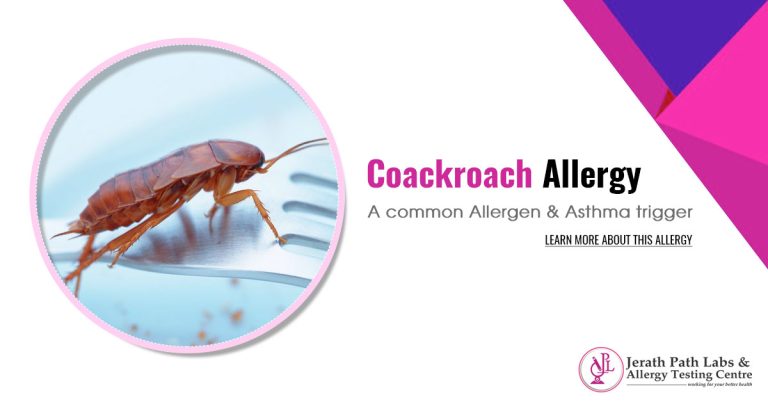The allergen behind your sensitivity manifestations might be hidden underneath the sink in your kitchen. No, it’s anything but a fragrant household item you utilise excessively while cleaning. Here’s a sign: This allergen has six legs. Indeed, we’re discussing cockroaches – the creepy crawlies that live in numerous areas around the globe. These bugs adjust effectively to different environments. They incline towards the warm conditions. Cockroaches contain a protein that is an allergen for some individuals and causes a hypersensitive, insusceptible response. The waste, saliva and body parts of cockroaches are allergens. Indeed, even dead cockroaches can cause unfavourably susceptible reactions. Cockroach hypersensitivities are remarkably average, and their incidence is rising daily. Cockroach sensitivities might be risky for individuals with asthma, as exposure may cause severe assaults in over half of those diagnosed. The allergen might be available regardless of whether you’ve never observed a cockroach in your home. It isn’t an impression of the tidiness of your home. Cockroaches live in hidden spots where you can’t see or easily clean.
Common cockroach sensitivity symptoms
- Sneezing
- Runny nose
- Itchy, red or watery eyes
- Stuffy nose
- Itchy nose, mouth or throat
- Postnasal dribble (a stream of bodily fluid from behind your nose into your throat)
- Cough
- Itchy skin or skin rash
Just in case your cockroach sensitivity triggers your asthma, you may suffer from
- Difficulty in sleeping
- Chest agony
- A shrieking or wheezing sound when breathing out
- Trouble resting caused by shortness of breath or wheezing
The Relationship Between Cockroach Allergens and Asthma Development
Cockroaches produce different sensitising proteins, for example, Bla g4 and Bla g5. The danger of developing asthma is maximum when a high exposure to cockroach allergies is related to hypersensitivity. Neither of these elements is responsible for asthma by itself. When cockroach allergens were breathed in, bronchoconstriction happened in such patients. Proteases in cockroach leftovers may debase the epithelial barrier in the human airways, allowing the more straightforward penetration of the allergens and immune actuation.
Not every person whose homes have cockroach attacks will have hypersensitivity or asthma side effects. But if you are experiencing wheezing, irritated eyes and nose, or a scratchy throat, you should visit an allergist or immunologist to determine what’s causing the manifestations. An allergist may suggest you for a skin prick test or blood test. Skin prick tests include:
- You are applying an allergen to the surface of the skin.
- Hold up for 15 minutes to check whether there’s a reaction, for example.
- A raised, red and itchy knock, whereas the blood tests recognise and measure the amount of allergen-specific antibodies in your blood.
Blood test results usually come in 10-15 days as the samples must be sent to a laboratory for evaluation.
Allergy Medications and Their Uses
Talk with your specialist about what prescriptions might be ideal for you.
Antihistamines are available as pills, liquids or nose sprays. They can alleviate sniffling and tingling in the nose and eyes. They also decrease a runny nose and, to a lesser degree, nasal stuffiness.
Leukotriene receptor antagonists block the action of important chemical messengers (other than histamine) involved in allergic reactions.
Cromolyn sodium is a nose spray that blocks the release of chemicals that cause allergy symptoms, including histamine and leukotrienes. This medicine has few side effects, but you must take it four times daily.
Decongestants are available as pills, liquids, nose sprays or drops. They help shrink the lining of the nasal passages and relieve stuffiness. Use decongestant nose drops and sprays only for a short time. Oral decongestants can cause side effects such as sleeplessness and increased blood pressure in some people. Please consult your doctor before using them.
Nasal corticosteroids are nose sprays. They lessen swelling in your nose. They are the best drug type for unfavourably susceptible rhinitis since they can reduce all the manifestations, including nasal blockage. Nasal corticosteroids have few side effects.
Tips for Managing Cockroach Allergies and Treatment Options
If your symptoms do not diminish after taking these medications, Your allergist may suggest immunotherapy (allergy shots). Immunotherapy is a long-haul treatment that can help counteract or lessen the seriousness of hypersensitive responses. Outstanding amongst other approaches to treating and avoiding cockroach sensitivities is to dispense with these creepy crawlies from your home. Key tips include:
- Cover all junk jars firmly.
- Store food in water/airproof holders.
- Clean every messy dish.
- Sweep any sustenance morsels from the counters, stove, tables and floor.
- Avoid forgetting pet food in a bowl. Clean the bowl frequently, as with other grimy dishes.
- Seal splits into the dividers and floors where cockroaches can enter your home.
- Use cockroach lures and traps. Try not to use sprays. They can chafe sensitivities and asthma.
Discover your immunity to cockroach allergies – contact Jerath Path Labs for precise cockroach allergy testing today.

